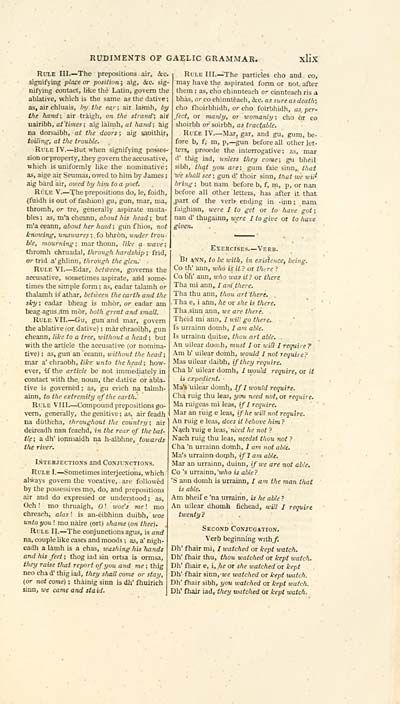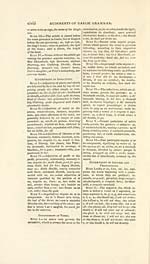Download files
Complete book:
Individual page:
Thumbnail gallery: Grid view | List view

RUDIMENTS OF GAELIC GRAMMAR.
xlix
RuiE III.— The prepositions air, &c,
signifying plate or position ; aig, &c. sig-
nifying contact, like the Latin, govern the
ablative, vshich is the same as the dative;
as, air chluais, by the ear; air laJmh, by
the hand; air tràigh, on t/te strand; air
yiàÌTÌhh, at'times; aig ìàimh, at hand; aig
na dorsaibh, at the doors ; aig saoithir,
toiling, at the trouble.
RtLE IV. — Hut when signifying posses-
sion orproperty, they govern the accusative,
which is uniformly like the nominative;
as, aige air Seumas, owed to him by James ;
aig bard air, owed by him to a poet.
Rt LE V — The prepositions do, le, foidh,
(fuidh is out of fashion) gu, gun, mar, ma,
thromh, or tre, generally aspirate muta-
bles; US, m'Ticheann, about his head; but
m'a ceann, aboiit her head; gun fhios, not
knoicing, unawares ; , fo bhròn, under trou-
ble, mourning; mar thonn, like a wave;
thromli chruadal, through hardship ; frid,
or trid a'ghlinn, through the glen.
Rule VI.— Edar, between, governs the
accusative, sometimes aspirate, arid some-
times the simple form ; as, eadar talamh or
thalamh i^ athar, between the earth and the
shy ; eadar bheag is mhòr, or eadar am
beag agus am mòr, both great and small.
Rule VII. — Gu, gun and mar, govern
the ablative (or dative) ; màrchraoibh, gun
cheann, like to a tree, without a head ; but
with the article the accusative (or nomina-
tive) ; as, gun an ceann, without the head;
mar a' cliraobh, /iA-s mito the head; how-
ever, if the article be not immediately in
contact with the noun, the dative or abla-
tive is governed; as, gu erich na talmh-
ainn, to the extremity of the earth.'
Rule VIII.— Compound prepositions go-
vern, generally, the genitive ; as, air feadh
na dùthcha, throughout the country; air
deireadh nan feachd, in the rear of the bat-
tle; a dh' ionnsaidh na h-aibhne, towards
the river.
Interjections and Conjunctions.
Rule I. — Sometimes interjections, which
always govern the vocative, are followed
by the possessives mo, do, and prepositions
air and do expressed or understood; as,
Och ! mo thruaigh, O .' ivoe's me ! mo
chreach, alas', is an-eibhinn duibh, woe
unto you ! mo naire (ort) shame [on thee).
Rule II.— The conjunctions agus, is and
na, couple like eases and moods ; as, a' nigh-
eadh a làmh is a chas, washing his hands
and his feet ; thog iad sin ortsa is ormsa,
they raise that report of you and me ; thig
neo cha d' thig iad, they shall come or stay,
(or not come) ; thainig sinn is dh' fhuirich
Sinn, we came and staid.
Rule III — ^The particles cho and co,
may have the aspirated form or not. after
them ; as, cho chinnteach or cinnteach ris a
bhas, or eo chinnteach, &c. as sure as death;
cho flioirbhidh, or cho foirbhidh, as. per-
fect, or niaidy, o> womanly ; cho or co
shoirbh or soirbh, as tractable.
Rule IV — Mar, gar, and gu, gum, be.
fore b, f, m, p,— gun before all other let-
ters, precede the interrogative; as, mar
d' thig iad, uiiless they come; gu bheil
sibh, that you are; gum faic sinn,. that
we shall see ; gun d' thoir sinn, that we wii^
bring ; but nam before b, f, m, p, or nan
before all other letters, has after it that
part of the verb ending in -inn ; nam
faighinn, were I to get or to have got;
nan d' thugainn, were I to give or to have
given.
Exercises.— Verb.
Bi ANN, to be with, in exisience, being.
Co th' aun, who is it ? or there ?
Co bir ami, icho teas it ? or there
Tha mi ann, I am there.
Tha thu ann, thou art there. ^
Tha e, i ann, he or she is there.
Tha sinn ann, we are there.
Theid mi ann, / ivil! go there.
Is urrainn domh, / am able.
Is urrainn duitse, thou art able. .
An uilear domh, must I or iviH I require ?
Am b' uilear domh, would I not requiie?
Mas uilear daibh, if they require.
Cha b' uilear domh, / would require, or it
is expedient.
Ma's uilear domh. If I would requite.
Cha ruig thu leas, you need not, or require.
Ma ruigeas mi leas, if I require.
Mar an ruig e leas, if he will not require.
An ruig e leas, does it behove him ?
Nqch ruig e leas, need he not ?
Nach ruig thu leas, needst thou not ?
Cha 'n urrainn domh, I am not able.
Ma's urrainn doiph, if I am able.
Mar an urrainn, duinn, if we are not able.
Co 's urrainn, who is able?
'S ann domh is urrainn, / am the man that
is able.
Am bheil e 'na urrainn, is he able ?
An uilear dhomh fichead, will I require
twenty?
Second Conjugation,
Verb beginning with/.
Dh' fhair mi, / watched or kept watch.
Dh' fhair thu, thou watched or kept watch.
Dh' fhair e, i, he or she watched or kept
Dh' fhair sinn, we watched or kept watch.
Dh' fhair sibh, you tuatched or kept watch.
Dh' fhair iad, they watched or kept watch.
xlix
RuiE III.— The prepositions air, &c,
signifying plate or position ; aig, &c. sig-
nifying contact, like the Latin, govern the
ablative, vshich is the same as the dative;
as, air chluais, by the ear; air laJmh, by
the hand; air tràigh, on t/te strand; air
yiàÌTÌhh, at'times; aig ìàimh, at hand; aig
na dorsaibh, at the doors ; aig saoithir,
toiling, at the trouble.
RtLE IV. — Hut when signifying posses-
sion orproperty, they govern the accusative,
which is uniformly like the nominative;
as, aige air Seumas, owed to him by James ;
aig bard air, owed by him to a poet.
Rt LE V — The prepositions do, le, foidh,
(fuidh is out of fashion) gu, gun, mar, ma,
thromh, or tre, generally aspirate muta-
bles; US, m'Ticheann, about his head; but
m'a ceann, aboiit her head; gun fhios, not
knoicing, unawares ; , fo bhròn, under trou-
ble, mourning; mar thonn, like a wave;
thromli chruadal, through hardship ; frid,
or trid a'ghlinn, through the glen.
Rule VI.— Edar, between, governs the
accusative, sometimes aspirate, arid some-
times the simple form ; as, eadar talamh or
thalamh i^ athar, between the earth and the
shy ; eadar bheag is mhòr, or eadar am
beag agus am mòr, both great and small.
Rule VII. — Gu, gun and mar, govern
the ablative (or dative) ; màrchraoibh, gun
cheann, like to a tree, without a head ; but
with the article the accusative (or nomina-
tive) ; as, gun an ceann, without the head;
mar a' cliraobh, /iA-s mito the head; how-
ever, if the article be not immediately in
contact with the noun, the dative or abla-
tive is governed; as, gu erich na talmh-
ainn, to the extremity of the earth.'
Rule VIII.— Compound prepositions go-
vern, generally, the genitive ; as, air feadh
na dùthcha, throughout the country; air
deireadh nan feachd, in the rear of the bat-
tle; a dh' ionnsaidh na h-aibhne, towards
the river.
Interjections and Conjunctions.
Rule I. — Sometimes interjections, which
always govern the vocative, are followed
by the possessives mo, do, and prepositions
air and do expressed or understood; as,
Och ! mo thruaigh, O .' ivoe's me ! mo
chreach, alas', is an-eibhinn duibh, woe
unto you ! mo naire (ort) shame [on thee).
Rule II.— The conjunctions agus, is and
na, couple like eases and moods ; as, a' nigh-
eadh a làmh is a chas, washing his hands
and his feet ; thog iad sin ortsa is ormsa,
they raise that report of you and me ; thig
neo cha d' thig iad, they shall come or stay,
(or not come) ; thainig sinn is dh' fhuirich
Sinn, we came and staid.
Rule III — ^The particles cho and co,
may have the aspirated form or not. after
them ; as, cho chinnteach or cinnteach ris a
bhas, or eo chinnteach, &c. as sure as death;
cho flioirbhidh, or cho foirbhidh, as. per-
fect, or niaidy, o> womanly ; cho or co
shoirbh or soirbh, as tractable.
Rule IV — Mar, gar, and gu, gum, be.
fore b, f, m, p,— gun before all other let-
ters, precede the interrogative; as, mar
d' thig iad, uiiless they come; gu bheil
sibh, that you are; gum faic sinn,. that
we shall see ; gun d' thoir sinn, that we wii^
bring ; but nam before b, f, m, p, or nan
before all other letters, has after it that
part of the verb ending in -inn ; nam
faighinn, were I to get or to have got;
nan d' thugainn, were I to give or to have
given.
Exercises.— Verb.
Bi ANN, to be with, in exisience, being.
Co th' aun, who is it ? or there ?
Co bir ami, icho teas it ? or there
Tha mi ann, I am there.
Tha thu ann, thou art there. ^
Tha e, i ann, he or she is there.
Tha sinn ann, we are there.
Theid mi ann, / ivil! go there.
Is urrainn domh, / am able.
Is urrainn duitse, thou art able. .
An uilear domh, must I or iviH I require ?
Am b' uilear domh, would I not requiie?
Mas uilear daibh, if they require.
Cha b' uilear domh, / would require, or it
is expedient.
Ma's uilear domh. If I would requite.
Cha ruig thu leas, you need not, or require.
Ma ruigeas mi leas, if I require.
Mar an ruig e leas, if he will not require.
An ruig e leas, does it behove him ?
Nqch ruig e leas, need he not ?
Nach ruig thu leas, needst thou not ?
Cha 'n urrainn domh, I am not able.
Ma's urrainn doiph, if I am able.
Mar an urrainn, duinn, if we are not able.
Co 's urrainn, who is able?
'S ann domh is urrainn, / am the man that
is able.
Am bheil e 'na urrainn, is he able ?
An uilear dhomh fichead, will I require
twenty?
Second Conjugation,
Verb beginning with/.
Dh' fhair mi, / watched or kept watch.
Dh' fhair thu, thou watched or kept watch.
Dh' fhair e, i, he or she watched or kept
Dh' fhair sinn, we watched or kept watch.
Dh' fhair sibh, you tuatched or kept watch.
Dh' fhair iad, they watched or kept watch.
Set display mode to: Large image | Transcription
Images and transcriptions on this page, including medium image downloads, may be used under the Creative Commons Attribution 4.0 International Licence unless otherwise stated. ![]()
| Early Gaelic Book Collections > Blair Collection > Argyleshire pronouncing Gaelic dictionary > (53) |
|---|
| Permanent URL | https://digital.nls.uk/76240489 |
|---|
| Description | A selection of books from a collection of more than 500 titles, mostly on religious and literary topics. Also includes some material dealing with other Celtic languages and societies. Collection created towards the end of the 19th century by Lady Evelyn Stewart Murray. |
|---|
| Description | Selected items from five 'Special and Named Printed Collections'. Includes books in Gaelic and other Celtic languages, works about the Gaels, their languages, literature, culture and history. |
|---|

